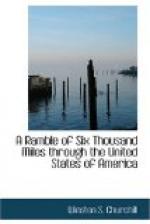Attached to the Wyandot reserve (nine miles by sixteen) is that of the Delawares (three miles square). On reaching Little Sandusky—Kahama’s curse on the town baptizers of America!—there are often five or six places named alike in one state: upper and lower, little and big, great and small—and invariably the same names that are given to towns in one State, are to be found in every other. Then their vile plagiarisms of European names causes a Babelonish confusion of ideas, enough to disturb the equanimity of a “grisly saint;” and, with all humility, I disclaim having any pretensions to that character. I have frequently heard a long-legged, sallow-looking backwoodsman talk of having come lately from Paris, or Mecca, when instead of meaning the capital of La grande nation, or the city of “the holy prophet,” he spoke of some town containing a few hundred inhabitants, situated in the backwoods of Kentucky, or amidst the gloomy forests of Indiana. The Americans too speak in prospective, when they talk of great places; no doubt “calculating” that, one day, all the mighty productions of the old world will be surpassed by their ingenuity and perseverance.
I reached Little Sandusky about one o’clock in the day, and there learned that there was a treaty being holden with the Delawares—accordingly I repaired to the council ground. On a mat, under the shade of seven large elm trees, which in more prosperous times had waved over the war-like ancestors of this unfortunate people, were seated three old sachems, the principal of the tribe. The oldest appeared to be nearly eighty years of age, the next about seventy, and the last about fifty. On a chair to the right of the Indians was seated a young “half-breed” chief, the son of one of the sachems by a white squaw; and on their left, seated on another chair, a Delaware dressed in the costume of the whites. This young man was in the pay of the States, and acted as interpreter—he interpreting into and from the Delaware language, and a gentleman of the mission (a Captain Walker) into and from the Wyandot. At a table opposite the Indians were seated the commissioners.
The Lenni Lenape, or Delawares, as they were called by the English, from the circumstance of their holding their great “Council-fire” on the banks of the Delaware river, were once the most powerful of the several tribes that spoke the Delaware tongue, and possessed an immense tract of country east of the Alleghany mountains. This unfortunate people had been driven from place to place, until at last they were obliged to accept of an asylum from the Wyandot, whom they call their uncle; and now are forced to sell this, and go beyond the Mississippi. To a reflecting mind, the scene was touching beyond description. Here was the sad remnant of a great nation, who having been forced back from the original country of their fathers, by successive acts of rapacity, are now compelled to enter into a compact which obliges




